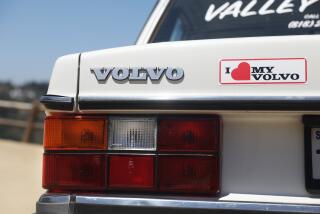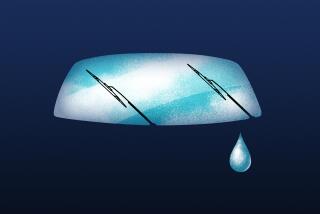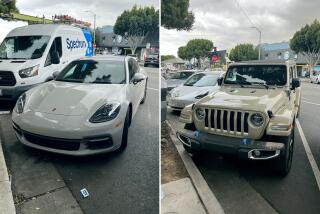Honey, I Shrunk the Porsche! : Economy: Farewell, middle-age ego and dreams. Hello, reality--which turns out to be not so bad.
- Share via
The night I bought my Porsche 944 five years ago, I was so in love with it that I sat in the driver’s seat in the pitch dark garage, inhaling the rich aroma of its austere, wonderful leather, thinking, “God, this is great.” I was so enamored of the car that as I gazed in the side mirror, the barely visible curvaceous lines of the rear fender looked good enough to lick. Women aside, I had never loved anything more.
After two years of delightful and exhilarating driving, I sold the car for a newer, turbocharged model. It was even better. I was thrilled with its terrific acceleration, its top speed of 140 m.p.h., which I hit once, white-knuckled and bug-eyed for 15 terrified seconds in the middle of the desert, glancing skyward for furtive CHP aircraft. I was thrilled with its power and panache. Never mind the expensive repair bills. Never mind the insurance of $200 a month. It was a beautiful car, a Porsche, and it was mine.
Then the economy went sour.
At first, to even consider that it might be financially wise to someday maybe sell the car seemed a threat to my very essence. To do so, I reasoned, would be to commence a long slide down the socioeconomic ladder, a first step that would inevitably lead to homelessness or worse. As I cruised along Sunset Boulevard past Bel-Air in my sleek and wonderful sled, I would picture myself sleeping under a freeway bridge, hoping the sprinklers wouldn’t come on. “Nah,” I said to myself. “It’s going to get better. There must be other ways to trim cash flow.”
First to go were the charities. Wham! Sorry guys, can’t help the trees, the ocean, the oppressed or the alma mater this year. Next went the odd subscription or two. Only Esquire, the New Yorker and Vanity Fair remained.
Then I got serious and cut out the car wash.
While none of these saved any appreciable amount of money, they were important moves psychologically, the tentative steps one would take toward the gaping maw of an open airplane door while preparing to parachute out into the great unknown. But I couldn’t quite get myself to look down. I could never seriously consider selling the car. I wouldn’t even think about it.
Finally, I got really serious. We cut off the movie channels on cable TV. I realize this might seem insignificant to people in Kiev or Calcutta or even Albuquerque, but here in Southern California, this was major. No movie channels! Things must be bad. Still, I could keep my beloved car.
Then the clutch snapped. When the $2,800 bill arrived--the second $2,800 clutch bill in 20,000 miles--something inside me also snapped. The time had come.
Farewell the loud alarums when I forgot to disable, farewell the smiles from passing women, gone the delight of soft enfolding leather, the surge of power and thrill of ego as I rocketed along. Within a week it was no more, sold to someone much like me with a glint in his eye and barely suppressed rapture in his voice when he took the keys. As for me, I never looked back.
Today I am driving my daughter’s Volkswagen Jetta, bedecked with Grateful Dead stickers, “Irie” signs and small colorful mushrooms posted on the rear view mirror, indexes of rampant puberty. At first I thought I would take them all off, but when a braless 17-year-old nymph in tight T-shirt said to me, “Cool car, man,” I changed my mind.
It’s a good car, functional and reliable, the radio works and so does the sunroof. I zip around town, feeling like I am 16 again, weaving in and out of traffic and having a ball.
I visited a Porsche dealership the other day on business. Amazingly, I felt not a twinge of envy or guilt. It seemed suddenly that I had the car of the ‘90s--efficient, modest but handsome, salable if I moved up, serviceable if I moved down.
“Whose VW is that parked in the lot?” one salesman asked, “we need to move it to let someone out.” “Mine,” I said with pride. We both smiled.






